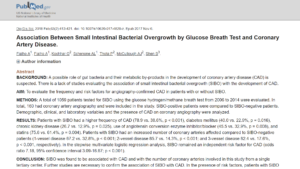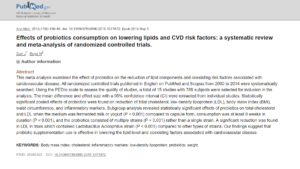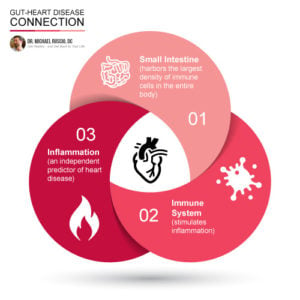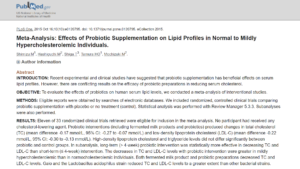Heart Disease Might Start in Your Gut – A Recent Discovery
Intestinal bacterial overgrowth has been shown to increase the risk of coronary artery disease. The good news is there may be a simple way to protect against this by utilizing probiotics which have anti-bacterial overgrowth effects. Let’s elaborate.
Dr. Michael Ruscio, DC: Hi everyone. This is Dr. Ruscio and let’s discuss the heart disease/gut connection. I want to share with you a study, and I’ll put the abstract of the study up here on the screen, entitled, “Association Between Small Intestinal Bacterial Overgrowth by Glucose Breath Test and Coronary Artery Disease.”
So small intestinal bacterial overgrowth (also known as SIBO) can be one cause of the symptoms of IBS. Gas, bloating, abdominal pain, constipation, and diarrhea being the most notable. And there may be, as this study is suggesting, a connection between SIBO (small intestinal bacterial overgrowth), your gut, and heart disease.
[Continue reading below]
Dr. R’s Fast Facts Summary
- SIBO-positive patients were compared to SIBO-negative patients.
- Patients with SIBO had a higher frequency of:
- Coronary Artery Disease 78.9 vs. 38.6%
- Diabetes Mellitus 40.0 vs. 22.9%
- Kidney Disease 26.7 vs. 12.9%
- SIBO was found to be associated with Coronary Artery Disease (CAD) and with the number of coronary arteries involved in this study.
- Further studies are necessary to confirm the association of SIBO with CAD. In the presence of risk factors, patients with SIBO may benefit from assessment for CAD.
Probiotics and Lowering Cholesterol
- Multi-strain probiotics are beneficial in lowering cholesterol. The inclusion of L. acidophilus appears to be important in the blend.
- Probiotics have been shown to be able to combat and decontaminate or clean out SIBO.
The Gut-Heart Disease Connection
- Inflammation (an independent predictor of heart disease)
- Immune System (stimulates inflammation)
- Small Intestine (harbors the largest density of immune cells in the entire body)
Counterpoints
- The research lacks good outcome data showing improving gut health reduces heart disease
- IBS does not appear to increase the risk of heart disease
- Get help with heart disease.
- Get your personalized plan for optimizing your gut health with my new book.
- Healthcare providers looking to sharpen their clinical skills, check out the Future of Functional Medicine Review Clinical Newsletter.
DrMR: So let’s go through some of the details. A total of 1059 patients were tested for SIBO and via coronary artery angiography—so essentially getting an assessment of the health of the coronary arteries.

And to quote here, again,
“Patients with SIBO had an increased number of coronary arteries affected compared to SIBO negative patients.”
So those with SIBO had more damage and blockage of their coronary arteries than those without SIBO. Now, there’s another thing here that I’ll put up here on the screen. And this may sound a little bit complicated. But I’ll quote again,
“In the stepwise, multi-variant, logistic regression analysis, SIBO remained an independent risk factor for coronary artery disease.”
Essentially, what that means is the researchers were trying to separate out for if the diabetes or the kidney disease or the use of high blood pressure lowering agents because one had high blood pressure or cholesterol lowering agents because one had high cholesterol were the reasons that the people with SIBO had the decreased health of their coronary arteries.
And what they found was that even after isolating all those variables out and controlling for just the association between SIBO and coronary artery disease, SIBO was still a significant contributing factor to the decreased health of coronary arteries.
And so their conclusion,
“SIBO was found to be associated with coronary artery disease and with a number of coronary arteries involved in this study. Further studies are necessary to confirm the association of SIBO with coronary artery disease. In the presence of risk factors, patients with SIBO may benefit from an assessment for coronary artery disease.”
So that’s, I think, another area where we are seeing the gut have such a far-reaching effect to many systems of the body, in this case, your cardiovascular system.
Now, I want to tie this in with probiotics. We’ve covered—and I’ll put a few links in here. And we know that a few high-level scientific analyses have been done showing that probiotics have the ability to lower cholesterol.

And I want to make an important tie-in for how probiotics may—and this is speculative—may help with heart disease. And quite simply, probiotics have been shown to be able to combat and decontaminate or clean out from the small intestines, small intestinal bacterial overgrowth. So if you take a probiotic, that is one way of addressing and correcting small intestinal bacterial overgrowth.
So there may be more than just the ability of probiotics to lower cholesterol. It may be because probiotics can clean out SIBO that they may have a potential benefit for heart disease.

So small intestinal bacterial overgrowth, this is where the bacterial overgrowth will be essentially interfacing with the immune system in the small intestine. And that’s not a happy, harmonious relationship. And that high density of immune cells will be likely reacting, causing inflammation. And inflammation is an independent risk factor for heart disease.
So some of these connections here, some of these inferences, have yet to fully be proven. But that certainly is a mechanism that I think is plausible.

Now, there are a couple counterpoints here I should point out before we get too carried away with the potential utility of the gut-heart connection. And that is, we don’t really have good outcome data showing that interventions that improve one’s gut health will decrease the incidence of coronary artery disease. So there’s more here to be documented.
Would improving your gut health in any way harm your heart? I very much so doubt it. I would only be inclined to think as long as the intervention for the gut was reasonable and low risk, something like probiotics, a low FODMAP diet, what have you, that you would only stand to gain from that.
Also, IBS (irritable bowel syndrome)—abdominal pain, altered bowel function, constipation, diarrhea, bloating—has not been shown to increase, at least to the best of my knowledge, the incidence of heart disease—heart attack, stroke, coronary artery disease, cardiovascular episodes. So that’s a good thing. But it also may be a bad thing. It may also indicate that even if one improves their IBS, there may not be any spillover benefit to one’s heart health.
However, I think it’s prudent to say that improving the health of your gut may give you benefit for your heart and certainly has no downside as long as you’re using noninvasive therapeutics to that endpoint.
So this is very interesting. We’re seeing a connection between the coronary artery health (obviously very important) and small intestinal bacterial overgrowth, the gut. And hopefully, this information will motivate you to take your gut more seriously. And this information will also help you get healthier and get back to your life.
2019 UPDATE
Here’s a more recent study that has similar findings about SIBO and coronary artery disease:
The Role of Small Intestinal Bacterial Overgrowth in the Pathogenesis of Hyperlipidemia
In this small study, 19 patients with coronary artery disease were compared to 10 healthy controls. A breath test showed the following SIBO infection rates:
| Patients with Coronary Artery Disease | 78.9% |
| Healthy Controls | 40% |
Researchers also noted that, for those individuals who tested positive for SIBO, hydrogen levels were much higher for the patients with coronary artery disease.
What do you think? I would like to hear your thoughts or experience with this.
- Get help with heart disease.
- Get your personalized plan for optimizing your gut health with my new book.
- Healthcare providers looking to sharpen their clinical skills, check out the Future of Functional Medicine Review Clinical Newsletter.
Dr. Ruscio is your leading functional and integrative doctor specializing in gut related disorders such as SIBO, leaky gut, Celiac, IBS and in thyroid disorders such as hypothyroid and hyperthyroid. For more information on how to become a patient, please contact our office. Serving the San Francisco bay area and distance patients via phone and Skype.
Discussion
I care about answering your questions and sharing my knowledge with you. Leave a comment or connect with me on social media asking any health question you may have and I just might incorporate it into our next listener questions podcast episode just for you!